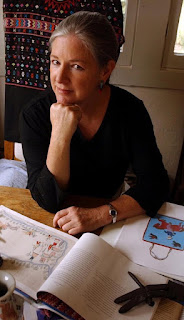I read aloud (with the text projected overhead) the first part, then we reacted to it for a bit before looking to Lynn White's "Religious Origins of our Ecological Crisis," the clichéd and abbreviated version of which traces everything to a clichéd abbreviated version of the Genesis narrative focused only on the "dominion clause." Then came the second narrative, whose difference from the first was more palpable and shocking than if done on separate days, and that the only dominion in this one is that implied between the man and his wife.
Then came Genesis 3, with its eating of tempting fruit, blaming and curses and banishment. We wrapped up with our other reading, an essay written by Chickasaw novelist Linda Hogan for the Humanities for the Environment Project as an alternative to Genesis-based and -formed frameworks for environmental humanities, which builds out the sorts of stories of collective world-building and maintaining involving all species we spent the last two weeks exploring. As the clock wound down I had student read aloud a key passage:
 Although they are loved, no other first people in any Indigenous creation story are challenged in such a way as Adam and Eve, tempted to eat of a divine food that will offer them knowledge. Any intelligent god would know that ‘his’ children would consume that fruit, would one day come from innocence into intelligence and knowing.
Although they are loved, no other first people in any Indigenous creation story are challenged in such a way as Adam and Eve, tempted to eat of a divine food that will offer them knowledge. Any intelligent god would know that ‘his’ children would consume that fruit, would one day come from innocence into intelligence and knowing.
 Although they are loved, no other first people in any Indigenous creation story are challenged in such a way as Adam and Eve, tempted to eat of a divine food that will offer them knowledge. Any intelligent god would know that ‘his’ children would consume that fruit, would one day come from innocence into intelligence and knowing.
Although they are loved, no other first people in any Indigenous creation story are challenged in such a way as Adam and Eve, tempted to eat of a divine food that will offer them knowledge. Any intelligent god would know that ‘his’ children would consume that fruit, would one day come from innocence into intelligence and knowing. Instead of learning their relationship to this world through the words of their creator, instead of the instructions that will keep a world alive, Adam and Eve are simply sent away. They are removed from the natural world, even from the divine by the simple act of seeking knowledge. Most of us know this story. In a way this is the story of the end of stories in this particular culture. After the shunning from the garden, what follows are stories of destruction and war, deception, betrayal and lies. Where are the stories about relationship and great love, or as with our own about how a canoe with singing women came down from the sky and one of the young women fell in love with an earth man who returned the love and their struggle and success in overcoming differences. Where in Christianity is the humour? The creator is not similar to humans who have flaws. It is as if that first sin was the ending. There is no longer a good garden, no forest. The people do not know the story of their land or world, or learn that they are one with the spine, heart and breath of all the rest. They are not a part of it.
We've been strangers in an estranged land for a long, long time.
Linda Hogan (Chicaza), “Backbone: Holding up our future,” in Humanities for the Environment: Integrating knowledge, forging new constellation of practice, ed. Joni Adamson and Michael Davis (Routledge 2017), 27-28 (picture)